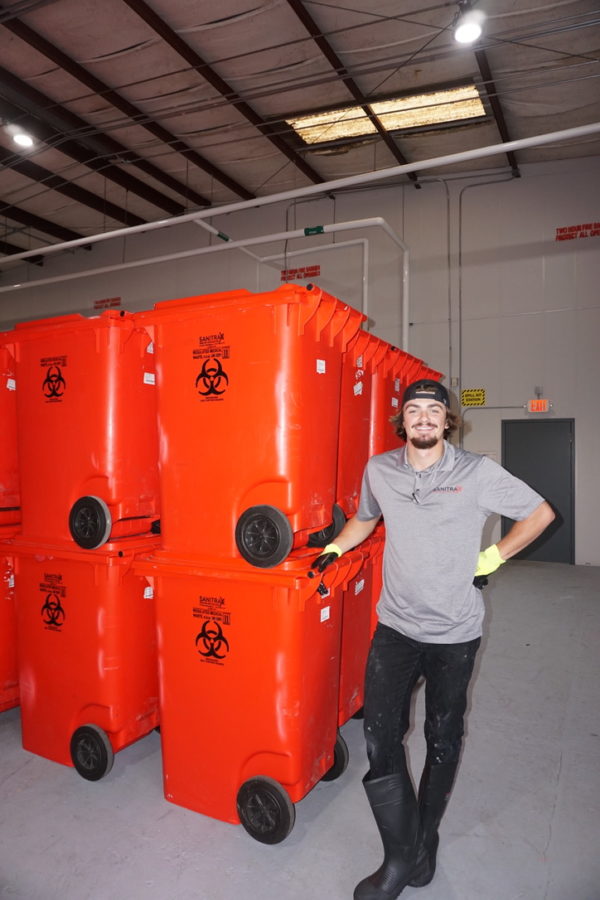A Closer Look at the Management of Biomedical Waste in Florida
From bustling hospitals in Tampa and West Palm Beach to neighborhood clinics in places like Gainesville, the healthcare industry generates a significant amount of waste in Florida, posing serious risks to both public health and the state’s fragile environment. That’s why healthcare workers and facility managers in The Sunshine State – renowned for its beautiful beaches, diverse wildlife, and intricate ecosystems – must be fully aware of the proper management of biomedical waste in Florida.
In this blog, we’ll explore what constitutes biomedical waste, the health risks and environmental impacts of improper management, and the legal/regulatory framework that helps to keep the Sunshine State safe and clean.

Biomedical Waste in FL – The Basics
The term biomedical waste, as the DOH in Florida defines it, refers to any solid or liquid waste that may present a threat of infection to humans. This type of waste can include:
- Used Needles and Sharps
- Bandages, Gloves, and Surgical Instruments
- Trace Chemotherapy Waste
- Bodily Parts, Tissues, & Fluids
- Blood & Blood Products
- Infectious Laboratory & Veterinary Wastes
The proper management of these types of biomedical waste is essential in preventing the spread of infections to healthcare workers and the general public, as well as helps to protect the environment.
Health Risks of Improper Biomedical Waste Disposal in Florida
Improper biomedical waste disposal in Florida poses serious health hazards. When biomedical waste such as used needles, contaminated materials, or laboratory waste is not correctly disposed of, healthcare workers, waste handlers, and even the general public can be exposed to any number of pathogens, leading to infections such as HIV, hepatitis B and C, and other bloodborne diseases.
Humans aren’t the only species at risk. Wildlife and plant life can easily come into contact with improperly disposed biomedical waste, potentially heightening the spread of diseases within their ecosystems.
Environmental Impact of Improper Biomedical Waste Disposal in Florida
The impact of inadequate biomedical waste disposal can also have severe environmental consequences, particularly in the state of Florida. If biomedical waste is improperly disposed of in landfills or open environments, hazardous chemicals, pharmaceuticals, and pathogens can leach into groundwater and surface water, degrading water quality and making it unsafe for drinking and agricultural use. Not only that, but antibiotic residues in the waste may lead to the development of antibiotic-resistant bacteria!
In The Sunshine State, with its vast network of waterways, these contaminations pose a significant threat. If pollutants from biomedical waste enter the state’s unique ecosystems, including the Everglades and numerous coastal areas, which are particularly vulnerable to pollution, it can severely disrupt biodiversity and degrade natural habitats.
Even the incineration of biomedical waste, if not properly managed, can produce greenhouse gas emissions and release toxic substances into the atmosphere, contributing to air pollution and climate change. This can be particularly harmful in a state where efforts to combat rising sea levels and protect diverse ecosystems are essential to the future of the state’s natural resources and the health of its communities.
Florida Biomedical Waste Regulations
In Florida, biomedical waste management is regulated by the Florida Department of Health under Chapter 64E-16 of the Florida Administrative Code. These regulations establish comprehensive guidelines for the proper handling, segregation, storage, transportation, and disposal of biomedical waste to protect public health and the environment.
Key regulations include:
- Requirements for healthcare facilities to segregate biomedical waste at the point of origin into color-coded and labeled containers
- Specific treatment methods, such as autoclaving or incineration, to neutralize infectious agents before disposal.
- Transportation of biomedical waste must be conducted by licensed haulers who adhere to strict guidelines to prevent spills and leaks during transit.
- Documentation, including waste tracking manifests, is required to ensure traceability from generation to final disposal.
- Facilities must provide biomedical waste management training in Florida to employees on proper waste handling procedures and emergency response measures.
Compliance with these regulations is absolutely essential in helping to mitigate risks associated with biomedical waste, and this adherence to proper management practices can go a long way in ensuring that Florida’s natural resources and public health are safeguarded.
If you’re a healthcare facility operator in Florida and you’re looking to properly dispose of biomedical waste at a competitive rate, reach out to the experts at Sanitrax for a free quote today!
